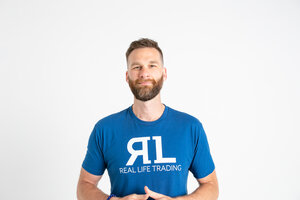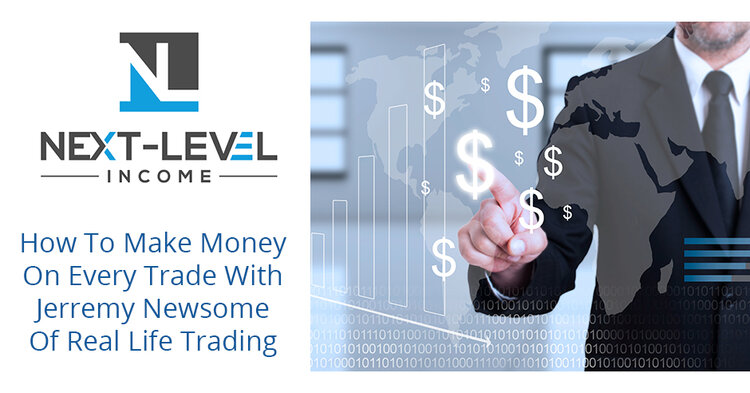Subscribe to The Next-Level Income Show
There Are So Many Options To Invest In Our Current World
I started by investing in the stock market, but learned that the stock market is volatile and you can lose as much as you win.
So, how do you make money on every trade?
Jerremy Newsome is someone who has been helping others by making proper tweaks in their mindset, heart set, and bank accounts. In this episode, Jerremy shares the answers to that question.
Jerremy joins me to talk about his personal journey into investing, the education he has been providing to others through Real Life Trading, and imparting the knowledge to the next generation. He also shares his thoughts on passive versus active investing and why our personal mindset sets us up for success. Follow along our conversation as he shares more.
Watch The Episode Here:
Listen To The Podcast Here:
How To Make Money On Every Trade With Jerremy Newsome Of Real Life Trading
We have Jerremy Newsome of Real Life Trading. His mission in life is doing rich lives with a mentally liberating education. He helps his clients make the proper tweaks in their mindset, heart set and bank accounts so they can impact the people causes and communities that they want to help.
—
Jerremy, welcome to the show.
Chris, this has been months in the making. I’ve been waiting for this for so long. Thank you.
I’m fired up to have you on. For the audience that isn’t familiar with you, share a little bit more about your background, history, and how you started Real Life Trading.
I know a lot of your readers are real estate enthusiasts. My profession has been in the stock market for the last years. My business partners and best friends are all in real estate. I love real estate. The way I got started in stocks is an ironic story that has a cool ending. It’s the movie, Forrest Gump. Eighty percent of the way through the movie says that Lieutenant Dan took his Bubba-Gump Shrimp Company and invested it in the fruit company. They no longer had to worry about money. I asked my dad, “What’s investing? What’s the fruit company?” I thought it’d be to not to worry about money anymore.
He told me about Apple, what investing is and how the stock market works. I thought it was such an intriguing concept, begged him to buy some shares of Apple. He’s like, “This is a movie. It doesn’t quite work that way. This is fiction.” I begged him and he eventually gave in. He was like, “You bring me some money. I’ll match it dollar for dollar.” I picked blackberries, push and sold them door to door in the summer of 1994 and made $1,500. I’m selling blackberries at six. Sure enough, to his word, he had to borrow some money from my uncle and we bought $3,000 worth of Apple stock in 1994.
What’s wild is I started my investing career worth about $3,000 too on my first real estate property and that was in the ‘90s as well. I got a couple of years on you here. We’ve had a lot in common with respect to the stock market, to real estate and I know that’s not all you do but with Real Life Trading, you guys have courses that span a lot of different things now. That’s what brought us together in I remember our first conversation. Next-Level Income is all based around education and at some point, it leads up to the investing part but education comes first. Tell us what people can find on the website, what was your first course and how did it get started?
My very first course was teaching individuals about a strategy called covered calls. For all of you real estate fans out there, you’ll love this one. Covered calls is renting out your stock. If you have houses, you rent them out and people live in them. When you own at least 100 shares of a company, you can rent out those shares per person at a higher price. They pay you for that opportunity to rent out your stock like someone pays you to live in a house. That was the very first product I ever released. I taught it at real estate places because most people who are interested in the stock market, generally, are real estate professionals because in real estate, the parlay into stocks is quite easy and vice versa. I’m teaching covered calls and end up teaching something called the core, which is how you can sell or rent out your stock and use that rent money to buy insurance on that position so you can create an unlosable trade for a certain period of time.
It was like, “Would you want to make 2% or 19%?” When you get into one of those situations in stock, you can have an absolute unlosable trade for a certain period of time mathematically. That excites people because it’s so rare for people to talk about not losing money in the stock market. People who generally deem the stock market as risky and gambling and that’s because they don’t know. Real estate has been around for thousands of years. It doesn’t matter if we build or buy it but we got to live somewhere. The US stock market’s been around for many years. If your dad’s dad doesn’t teach your dad’s dad about it, none of your lineages, your mom’s mom, if none of them know, you don’t know. It’s simply miseducation that what’s keeping so many people from the stock market.
There’s so much to know. I always said it’s like playing the World Series of Poker. I talked to a lot of people. Younger investors are like, “I’m doing this and that.” I was in the ‘90s trade and I talk about this in my book. I was day trading and learned some hard lessons. I made a lot of money, lost a lot of money but learned some invaluable lessons that were cheap at the time. People that are naive, I said, “Have you taken a course? Do you know what you’re doing? How long have you been doing this?” “No, my friend told me this and that.” I said, “Would you sit down at the World Series of Poker against these guys and do that because that’s what you’re doing if you don’t know? It’s a skillset.” Would you agree?

Money On Every Trade: Real estate has been around for thousands of years. It doesn’t matter if we build or buy it, but we have to live somewhere.
Absolutely. I love that analogy and I love your book. The analogy is amazing because so many people do say, “All the stock market is gambling.” I was like, “I know professional gamblers, people who make money full-time gambling essentially, playing poker or even roulette.” I don’t know anyone who makes money playing craps professionally but I do know roulette players and poker players who can money consistently and It’s amazing. They have a system, risks, rules and they have a plan. It’s a systematized strategy that they follow over and over. Trading is a lot of second-grade Math, a little bit of Division, percentages all the time, some decimals here and there, that’s it. You can use a calculator or an Excel spreadsheet because you buy $1,000 shares of any company in the world. If it goes down $0.70, you will lose $700 or if it goes up to $1.20, you make $1,200.
That’s a very real-life example of what happened to me. Now, one of my main stocks, my day trade for cashflow is AMD, Advanced Micro Devices. I know what they are, how they work, I liked them, everyone knows what AMD is. They have what’s called an Average True Range of $3 a day. This thing moves up and down $3 a day almost all the time. I don’t know what direction it’s going to go but it generally moves about $3 a day. If I can carve out a $1.90 on 2,000 shares, that’s almost $4,000 a week that might require approximately three hours of work once you know what you’re doing. Meaning it’s not that hard. Today I took a trade on AMD, I lost $1,000 on it, took another trade on AMD today and I made $1,800 on it. The difference between those two numbers is $800. I made in $800 today in cashflow. I can take that, buy an asset, virtual assistant, employee coaching session book. I can take that money or cashflow that I made and reinvest it in my future self.
That’s the strategy I teach. If anybody read the book or familiar with it, we talk about make, keep and grow. You need to make more money, keep more of that money by proper strategies whether that’s in that’s tax strategy, insurance strategy and you need to grow the money. You take that money that you’re making an excess of what you’re doing and growing it. That’s exactly what you’re talking about. That’s one of the things you do. You teach people how to make money in addition to doing what they’re typically doing. I love what you said about second-grade Math because I have a 3rd and 5th-grader graduating here and they’ll be a 6th and 4th grade.
My third grader loves to make money. We went to a lacrosse tournament. My eleven-year-old is playing in a lacrosse tournament. Do you know what my third grader’s doing? He made comic book copies and selling his comic book series. He made $66. I may have him do one of your courses because he’s the guy that can use his second-grade Math to do this. If somebody is saying, “What’s a good course to start with?” You even teach your children are teenagers that want to learn. I learned at eighteen from a family friend about the stock market but I was self-taught after that.
I do my best to create educational components for anyone of all ages because I went to college to learn this and you know how it turned out. It was fun to party but you don’t learn a lot of on-the-job training. For me, I went out and realized that there’s a lot of seminars, conferences and webinars but they’re generally boring me. I love your stuff, podcast, content and book. It’s beautiful. It’s valid to the point that it’s informational but it’s also exciting. At least it’s not tone-in for your brain. That’s what I tried to do. I went out and created a bunch of content that’s free so that people can remove, “I don’t have the money,” barrier because I love taking that excuse away from people. They go like, “I don’t have the money.” I’m like, “It’s free. What is your excuse now?” It will come up with, “I’m busy.”
I made it for free. You can go to RealLifeTrading.com, a beautiful green button that says, Beginner. Click on the Beginner section and start going through the Beginner’s classes. Anyone can do that. I do have for kids or for young adults course that’s designed for children. The cool crazy part, I taught this class in March 2021 and I talked about games. This was right about the time it started exploding. I had some kids who bought, 4 or 5 shares of GameStop that made $1,600 and they were freaking out. I’m sure your kids probably play Roblox. I have an eleven-year-old as well and I have him buying and selling some shares from Roblox and that’s the money that he perpetually uses to buy his game stuff.
I’m trying to teach my boys a lesson about what’s going on right now, the free money that’s coming at the door and they overheard a conversation. I have a tenant in one of my commercial buildings and they’re having to close their business because they can’t get people to work. They have a tattoo studio and people don’t want to get off unemployment. My younger son was like, “What do you mean they’re getting checks from the government? Because he’s like, ‘How do I get a check from the government?’” I started explaining it to him. I’m like, “They’re getting money for doing nothing essentially.” I put it very simply. He goes, “Dad, we get money for doing nothing.”
They both started Roth IRAs. They have jobs, work for our business, have other stuff that they do. They contribute every month and they look at their account statement. I’m telling this story because this is passive. They know that their money is making money for them. This may be a good way for me to teach them about the active way of investing in the stock market. Having said that, what are your thoughts on passive versus active investing? You can be successful at both but there are different strategies. What’s your opinion on that?
You should have both. The longer-term investing is going to outperform short-term. That’s a guarantee in the sense of the short-term for me personally on cashflow creation. It’s like flipping houses and you’ve million house flips. Those are short-term. It’s cashflow. Your goal is to make some money so you can use that money to buy another asset. That’s short-term and active trading. Active trading is very similar to playing a sport. It keeps you healthy, your brain and body active and understanding what’s going on. Passive investing would be essentially owning the field, part of the stadium or jerseys that you’re playing on. Being both aspects of the game, there’s nothing wrong with it.
People love to play. Who doesn’t want to be active? Who doesn’t want to enjoy life and being in a competitive format because it’s fun and exciting? You will make more money longer-term doing the investing but why not make money both ways? The stretch that allowed people or the mindset shift is to have as many streams of income as you can. You know this. You preach it all the time. There’s nothing wrong even if it’s an extra $100 a month. What that does is it tells your brain, “I got this over there.” It lets you stress out less when you do have those crunch months because every investor has it that are like, “I don’t know how I may raise this $1 million. This is going to stress me out right now.” There’s a window or a day where you stress about it and your brain begins to appreciate what you have. What you appreciate appreciates. The beautiful paradigm shift is happening of, “I got other things that are coming in. I’m good.”

Money On Every Trade: The longer-term investing is going to outperform the short-term.

Money On Every Trade: If you want to change your life, change one belief that you have about anything once a week, and your life will be so radically different a year from now.
The scary part is doing it. They’re taking that jump because our brain says, “I have less money.” It’s like, “No. Time is money.” You don’t have less anything, the same equivalent because you bought time. If time is money, then that’s what you want. You want money or time. You’re both. Either one is equivalent.
You make a great point. It’s hard. You’re like, “If I hire this person to mow my lawn at $20 an hour, I have to pay them $20 an hour or $40 or $80. I’m out $80.” Be productive. If you’re making $500 an hour for four hours, that’s $2,000 of the value you’ve created and you pay somebody $80 for that. It’s a good payoff. We’ve covered a lot of different stuff and I’m going to have you back on because we can continue this conversation in a lot of different ways. You’re a little bit younger than me. If you can go back in time to your 25-year-old self and all this stuff that we’ve covered, if you could say, “Hey, 25-year-old Jerremy.” What advice would you give him?
What I would sum up extremely well to my 25-year-old self is, “Know how to value your time and have standards that you need.” When I was 25, I didn’t know what time value was and I also didn’t truly understand how to have standards. I would hear the term a lot, “Raise your standards.” I didn’t know what that meant. Crazy example for everyone reading, let’s say you have a service industry. You charge $1,000 for whatever service. They pay me $1,000 and I’m done. You do your service and that’s great. That’s a standard. What if you went above and beyond? What if you created like you? When I’m on this show, you sent me a book with a hand letter, that’s a standard.
How many people will do that? Very few. As we start to slowly grow, our standards will start to change. That was for me. That would be so massive. Have a higher standard for yourself and live to it. When I was 25, I’d rather eat a $2 cheeseburger other than a $20 meal. It was amazing, delicious and beautiful because there are so many crazy distinctions there. Because of a $20 meal, now I’m sitting next to someone who’s worth more. I’m talking to a waiter who’s better, was more articulate. It’s also better for my body, I’ll feel better, perform better and be able to do things I might not do after having this $2 burger. Even though I would have an $18 difference between the two, that’s just money. I’d rather have the time and the experience in that standard of being around the quality of people who might eat that more expensive meal than that $2 cheeseburger. That’s what the standard is. It’s totally different.
Like you were saying with your coaching client, “When you change your mindset and realize that you’re capable of more,” these are concepts that truly rich use. They understand what it is to have time, have control of their time and do that and have that performance. If you’re reading, that’s probably the most important thing that we’ve talked about. Check out Real Life Trading. Jerremy, what’s the best way for our audience to check out your website, information, learn more about all your courses, especially the free ones that we talked about earlier.
Pop into RealLifeTrading.com and contact, click on, watch any video link, article or blog that is of interest to you. If you guys do come and you come from Chris, let me know, email me at JerremyNewsome@gmail.com. If you got value from this podcast as much as I did, let me know and I’ll be happy to figure out an amazing way to give as much value as I can to your tribe and readers because that’s all I’m here for. If I want to create $1 billion of value, to go help a billion people, both you and I are on the path to do that.
That’s why we had you on. We’re always looking out for readers, clients, everyone out there, raise your standards like we talked about, help give you more education. Jerremy, thank you so much for being on the show and help us do that.
My pleasure. Thank you.
Important Links:
-
Joe Rogan – Episode with Jesse Itzler
About Jerremy Newsome

My mission, my calling in life is to enrich lives with mentally liberating education. That is why you are here. You are in the search of a fun, new and thrilling awakening regarding your finances, your money along with the abundance and freedom we all seek in life.
Freedom is my paradise! I help my clients make the proper tweaks in their mindset, their heartset and their bank account to receive all they cherish!
I help you elevate your money so that you can impact the people, the causes and the communities that you have always yearned to help.
My focus since 2010 has been guiding humans through an emotional journey with their money, their stock account and their crypto purchases, to ensure radical life changes!
I am a professional button presser. At some point, certain buttons need to be physically pressed to create massive alterations. I help numerous clients understand the demystify their liquid assets, specifically the stock market, the crypto markets and our most valuable asset, TIME!
Love the show? Subscribe, rate, review, and share!
Join the Next- Level Income Show Community today:
Tagged: Money On Every Trade, Real Life Trading, Investing, Passive And Active Investing, Cryptocurrency, Mindset, Group 2


Subscribe to The Next-Level Income Show